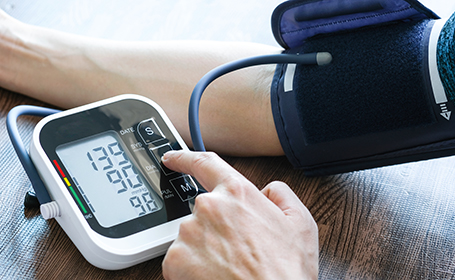
Blood Pressure Q&A
Dr Farhan Ahmed from The Saxon Clinic tells you everything you need to know about blood pressure, including advice on what to do if yours is high or low
What is blood pressure?
Blood pressure is the measure of the force your heart uses to pump blood around your body. It is the amount of pressure put on your blood vessels as your blood circulates.
How do they measure blood pressure?
You will probably have had your blood pressure taken before and may have been given a reading of two numbers, for example ‘100 over 80’.
The first number is your systolic blood pressure. This is the pressure when your heart pushes blood out. The second number is your diastolic blood pressure. This is the pressure when your heart rests between beats. Both are measured in millimetres of mercury (mmHg).
So ‘100 over 80’ would mean that you have a systolic pressure of 100mmHg and a diastolic pressure of 80mmHg.
As a rule, a healthy reading is between 90/60mmHg and 120/80mmHg.

What is a normal blood pressure?
Even if they've been tested and told the results, many people don't know how the meaning of their blood pressure readings. However, it's important to know what's considered normal or healthy.
As a rule, a healthy reading is between 90/60mmHg and 120/80mmHg.
If your reading is 140 over 90 or above you are considered to have high blood pressure.
Low blood pressure is generally defined as 90/60mmHg or below. This blood pressure chart may help you to understand your own reading further.
Which is the most important number in blood pressure?
It is believed that systolic pressure (the top and higher number) gives a better indication of the risk to your health, and that a higher systolic pressure is more dangerous than having a higher diastolic pressure.
However, this is not the case for everyone, and research to date is not exhaustive. You should be concerned if either of your numbers is high.
What does it mean to have high blood pressure?
Blood pressure varies every second according to the demand being put on your body. Normally it will go up during physical activity and when you are resting it will go down again.
However, if yours is persistently raised, even when resting, then this is called high blood pressure (hypertension). This means your heart is having to work harder to pump blood around your system.
So, if your reading is 140/90mmHg or higher, your doctor will likely recommend methods to get your reading back into the healthy blood pressure range.
In particular, having high blood pressure when in your 40s or under is unusual and needs to be investigated further.
What causes high blood pressure?
You have a higher risk of developing hypertension if you:
- Are over 65
- Are overweight
- Have a family history of hypertension
- Eat a diet high in salt
- Don't eat enough fruit and vegetables
- Don't exercise regularly
- Drink too much alcohol
- Have too much caffeine
- Smoke
- Don't sleep well/enough
About 10% of cases of hypertension are caused by other medical conditions such as hormonal imbalance, kidney disease or diabetes.
Is high blood pressure dangerous?
Yes. It puts strain on your blood vessels, heart, brain and other organs and can contribute to the development of a number of life-threatening conditions.
Hypertension makes you more likely to suffer from heart attacks and strokes. It can increase your risk of kidney disease, heart disease, arterial disease, aneurysms and vascular dementia. High blood pressure shouldn't be ignored. It is known as a silent killer and rightly so.
What are the symptoms of high blood pressure?
Generally, there are no major high blood pressure symptoms to look out for. In rare cases, symptoms can include headaches and blurred vision. However, the majority of people will not notice any symptoms at all.
What can I do to prevent high blood pressure?
The best way to prevent hypertension is to maintain a healthy weight, get regular exercise and eat a balanced diet. Don't drink too much alcohol or coffee and don't smoke.
As blood pressure can go up in times of stress, getting enough sleep and using relaxation techniques can also be useful. If your reading is already high, these tips are a good starting point for how to lower blood pressure.
If you want to keep track of your blood pressure yourself, monitors are available to purchase and use safely at home. Since levels can vary throughout the day, readings need to be taken over several intervals, at rest. It's best to keep a diary of your readings. If they are consistently raised, for example, more than 140/90, then consult your doctor.
Hypotension can also be caused by certain medications, and by certain health conditions including diabetes.
How is high blood pressure treated?
If diet and lifestyle changes do not work, your doctor will look into how to reduce your blood pressure using medications. In some cases, more than one medicine may be required.
What causes low blood pressure?
Low blood pressure (hypotension) is less common than high blood pressure. It's identified as a reading of 90 over 60 or less.
There are various causes of hypotension, some of which are not too worrying. For example, some people have low blood pressure because they're very fit and healthy. Others inherit it from their parents, while some people's blood pressure drops as they get older. Pregnancy is another common cause.
Hypotension can also be caused by certain medications, and by certain health conditions including diabetes.
Is low blood pressure dangerous?
Hypotension is not considered to be a risk unless you are experiencing negative symptoms.
Low blood pressure symptoms include:
- Feeling dizzy or lightheaded
- Feeling sick
- Blurred vision
- Feeling weak
- Confusion
- Fainting
If you are frequently experiencing any of these symptoms, you should go and have your blood pressure checked.
Hypotension can normally be managed either by treating the underlying cause or through lifestyle changes. Your GP will help you decide what's best for you.

Tags
How do I book an appointment?
If you're concerned about symptoms you're experiencing or require further information on this subject, talk to a GP or see an expert consultant at your local Circle Hospital.